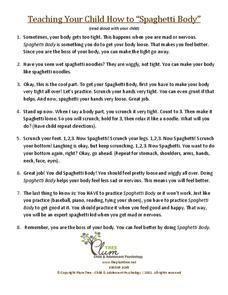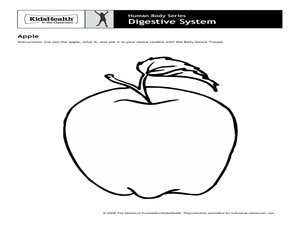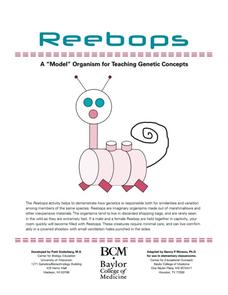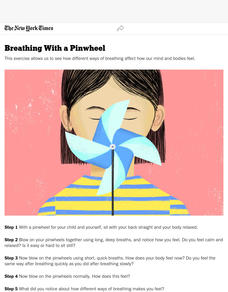Curated OER
Human Body Series - Bones, Muscles, and Joints
Strengthen understanding of the musculoskeletal system with a structured lesson! Begin with a discussion of bones, joints, and muscles. Have small groups read assigned articles and watch videos to gather information and then write a...
Early Childhood Learning and Knowlege Center
My Body My Senses
In a comprehensive unit of activities, learners explore the five senses. Youngsters discover the many different body parts and their functions that allow humans to have sense of sight, touch, smell, taste, and hearing. The best way to...
Plum Tree
Teaching Your Child How to "Spaghetti Body"
We all feel stressed at times, but we don't have to feel that way for long by practicing a coping skill called, Spaghetti Body. When a high stakes test or presentation is on its way, follow the instructions on this...
PBS
Robot Body Language
Don't be so emotional! Scholars take part in an activity where they consider how future robots will be able to show emotions. They place paper bags over their heads, act out emotions through body movements, and have others guess the...
Howard Hughes Medical Institute
Modeling the Regulatory Switches of the Pitx1 Gene in Stickleback Fish
Gene switches work similarly to light switches in controlling one feature of their environments. Scholars study the Pitx1 gene in a specific type of fish. They learn the different ways this switch controls various body parts and...
Curated OER
Human Body Series - Cardiovascular System
Pump up your class while studying the cardiovascular system with this pair of activities. In one, learners record heart rates during different actions. In the second, they read kid-friendly heart health articles online and then write a...
Curated OER
Human Body Series - Digestive System
With articles entitled, "What's Puke?" and "What is a Fart?" this digestive system lesson is sure to be a gas! Elementary anatomists do a belly dance to illustrate how food moves through the digestive system and then design a board game...
Baylor College
Why Circulate?
Lub-dub, lub-dub. Why does the heart beat? Why does blood circulate throughout the body? Life scientists find out how important circulation is for dissolving and dispersing materials by timing how long it takes for food coloring spread...
Baylor College
Reebops: A “Model” Organism for Teaching Genetic Concepts
In a sweet simulation, junior geneticists examine the chromosomes of a fictitious Reebop marshmallow animal, combine chromosomes to produce offspring, and then make a model of the resulting Reebop baby. Phenotypes include number of...
The New York Times
Breathing With a Pinwheel
A pinwheel encourages deep breathing to calm one's body and recenter their thoughts. Scholars breathe into a personal pinwheel with different types of breathing patterns then answer a question about how they feel.
Lake Science Collaborative
Blood Circulation Simulation
Act out the circulation of blood in the body with an innovative activity. Kids act as either body parts or blood, and carry necessary nutrients and waste throughout different stations to represent the way that oxygen circulates.
Terry Kawas
One Hundred Shoes
Practice counting and patterns in one fun activity! After discussing the word cent and what it means, kids count the number of body parts on the centimeter and add two legs to each. They then determine if there is a faster way to...
Curated OER
Body Part Tag
Students participate in a game of tag using body parts. They are dodgers and taggers in this game. Dodgers try to avoid having teacher-named body parts tagged by the taggers.
Curated OER
Human Body Series - Respiratory System
Elementary schoolers play a respiratory relay toss in order to take in the respiratory system! They also create their own question cards based on several kid-friendly online articles about breathing and the health of the lungs. They use...
Curated OER
Grammar Games and Activities
Thirty pages of grammar activities? Your young grammarians will be well versed in the parts of speech, basic verb tenses, and much more after completing even a handful of these exercises.
Forest Foundation
The Nature of Trees
Young botanists examine the different parts of tress and then draw parallels between the functions of these parts and the function of parts of the human body.
MOST
What Are Cells?
What's in a cell, anyway? Kids read informational text on what makes up both animal and plant cells, including a page of vocabulary terms they will need to be familiar with (cytoplasm, ribosomes, vacuoles, etc.). Full-color images...
Nemours KidsHealth
Human Body Series - The Five Senses
Get your class up and moving with these engaging hands-on-activities that target their five senses. Children explore four different work stations that require them to look, smell, hear, touch, and taste as they record their responses...
Teach Engineering
Pill Dissolving Demo
Plop, plop, fizz, fizz, oh that one is the fastest. The teacher demonstration is the second part of a four-part series. The class observes how different pill types dissolve in simulated stomach acid. They determine which one dissolves...
Serendip
How Do Muscles Get the Energy They Need for Athletic Activity?
Every muscle movement requires energy, but where does that energy come from? Scholars answer this question and more as they complete a worksheet. By following the directions, completing research, and discussing it as a class, they begin...
Teach Engineering
Making Model Microfluidic Devices Using JELL-O
Nothing flows like J-E-L-L-O! In the final portion of a four-part series, pupils create scale models of microfluidic devices out of gelatin and bendable straws. They use their devices to test various flow rates in the delivery of...
NOAA
Climate, Weather…What’s the Difference?: Make an Electronic Temperature Sensor
What's the best way to record temperature over a long period of time? Scholars learn about collection of weather and temperature data by building thermistors in the fourth installment of the 10-part Discover Your Changing World series....
Smarter Balanced
How the Brain Works
Cerebrum, cerebellum, brainstem, pituitary gland, and spinal cord. Prepare your class for a performance task assessment on the brain and how it works with a scripted plan that defines these terms and identifies the functions the...
Teach Engineering
Edible Rovers (High School)
Design and build a rover ... then eat it? This activity has groups of two design and build Mars rovers. The teams determine what instruments they want to include with their rover and plan a budget. They calculate the cost of the body of...
Other popular searches
- Human Body Parts Pictures
- Human Body Parts
- Spanish Human Body Parts
- Body Parts Worksheet
- Spanish Body Parts
- Horses Body Parts
- Body Parts Names
- Human Body Parts Edible
- Parts of the Body
- Ants Body Parts
- Jellyfish Body Parts
- Human Body Parts Bingo























